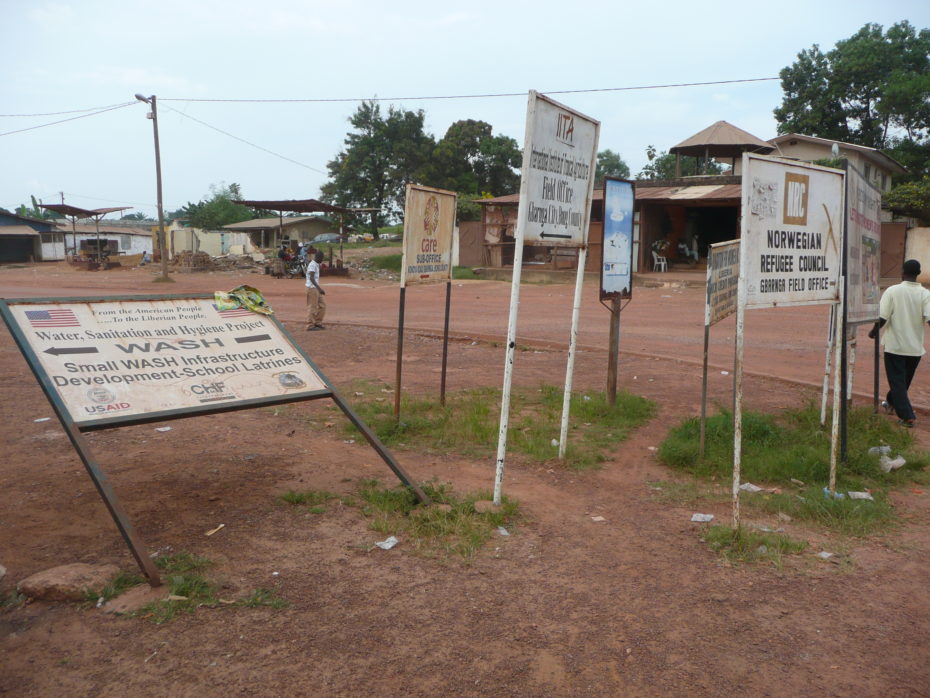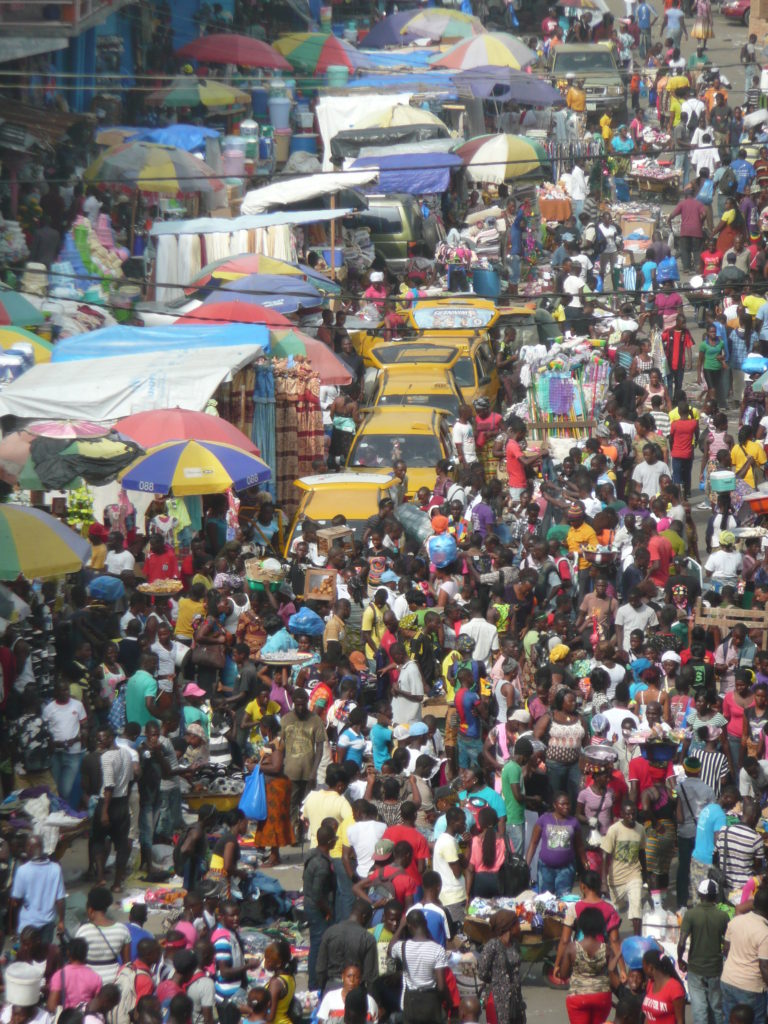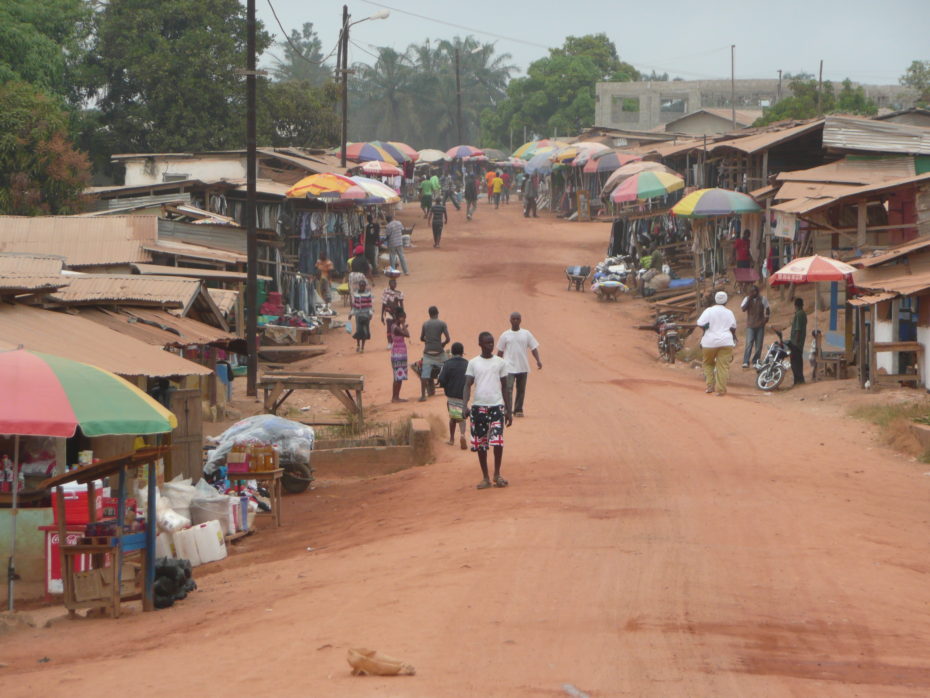I’d hesitate to recommend a decent, well publicized war as a development policy but ten years of aid after the country’s horrors have seen improvements due to foreign agencies which would never have occurred otherwise. Few indications of the war remain, only the occasional abandoned ruin, some graced with the pockmarks of bullets and shrapnel, forlornly waiting for their former owner to return, in the slim hope they may still be alive.
If there is one thing aid agencies love doing it’s making sure everyone knows what they have been up to. Thus crops of signs have sprung up everywhere promoting their good deeds. Even driving through small villages you can pass a cluster of them, counts of the toilets provided or the worthy provision of a school building. Elsewhere signs advocate good health and hygiene practice ( the words pee pee and poo poo spelling things out in language everyone will understand) and combatting violence against women and children. It’s a striking contrast to the crumbling wreck of Guinea where the characteristic white 4×4’s of aid agencies are a rare sight indeed, despite the evident need.
Having said that I don’t want to give the impression that everything is fab and groovy. A load of shiny new buildings and schools helped out with US Peace Corps teachers does nothing to build an economy and create jobs. The clearest evidence of this is the lack of trucks on the roads outside the capital. Apart from roadwork vehicles I often saw none or just one in a day. No trucks means nothing is being bought, sold, imported or exported and the corresponding lack of employment was the commonest complaint from those I met.
The modest economic possibilities of the capital Monrovia have drawn the hopeful hordes from the countryside, creating a seething mass of chaotic humanity at its centre. If you are looking for an easy introduction for your first experience of African city life it would probably be best not to put Monrovia at the top of your list. The tsunami like assault on the senses that is the waterside market compresses thousands into constant physical contact amongst a cacophony of sellers shouting, chanting, singing and even bell ringing to attract customers. I fear many are driven more by optimism than profits for there are too many people selling much of the same thing to customers of limited income.
Although the very real risk of violent crime has diminished in recent years there is still an undeniable tension in the air: shouted arguments and angry shoving appear commonplace. Maybe they just like a good argument, as two taxi journeys illustrated. Taking a shared taxi to the centre of Monrovia I asked a man to confirm what I needed to ask for in the future as I had been met with incomprehension in other towns when asking for the town centre, “into town” he replied, which led to a ten minute argument between passengers about where exactly “town” was and even managed to include reference to constitutional politics. On another journey the driver apologized for the delay when another passenger had to perform some errand, replying, “it’s no problem, I am used to it having come from Guinea, where you often stop for prayer breaks as it’s a Muslim country”. Oh dear! With two people in the car who felt that anyone who didn’t belong to their own specific church didn’t even qualify to be called a Christian the remaining hour was spent in heated “debate” concerning pointless disagreements in scripture. That was the last time I mentioned religion in Liberia. You don’t need to be a psychologist to realize that years of civil war leave behind more than a bit of anguish, even for those not complicit in violence and when teenage boys have been pumped full of drugs, handed an AK47 and made to kill their fellow countrymen they are unlikely to turn in to the adults we would like them to be. Ten years after the war many such young men walk the streets of the city.
However, despite this menacing shadow on the nation’s soul Liberians generally are as welcoming as anyone in the region. The few exceptions to this are those who regard visiting whites such as myself as only good for providing a free beer and are disinterested in offering little in the way of gratitude in response. Also, far more common than in other countries was the blunt demand, “give me money”. A small measure of linguistic excuse can be given, in that if there is one thing you learn from travelling to many countries is that our form of English is overburdened with formalized politeness. No other language could, for example offer a faithful translation for, “I am dreadfully sorry to bother you but could I possibly trouble you for the price of a cup of tea please sir”. I can only offer two potential explanations for this kind of behavior, apart from the possibility that many Liberians are just rude. Firstly being devoutly Christian, rather than Muslim there is less of a hardwired, cultural welcome of strangers. That is not to blame the religion itself as the Bible provides plenty of good examples of such values. Secondly after ten years of white people turning up giving them stuff for free it has become accepted, that is simply what white people do. Certainly not one person assumed I was a tourist, they thought I was either a missionary or aid worker.
With tropical beaches and untouched areas of jungle full of wildlife there is genuine tourist potential, particularly as the rest of West Africa decided to chop most of their trees down for firewood. Maybe some aid would be better directed to developing this as it would be a sustainable source of foreign cash and jobs for highly disadvantaged rural communities.
I had thought that the rigours of travelling in Guinea would be needed as good training for a war ravaged Liberia but instead I found better roads, transport and accommodation. Also with a largely stable, accountable and democratic government there was a belief that things would, if only gradually get better. Consequently I have developed a tourism development proposal for the government with the proud campaign slogan: visit Liberia, it’s not as fucked up as you think!







